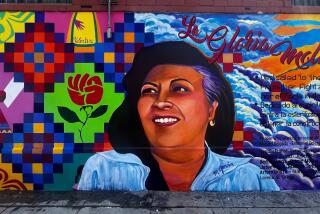Debut screenplay turns out to be prophetic as mother wins scholarship.
- Share via
At the end of Alicia Bonilla’s first screenplay, a divorced woman who has polio and two children receives a scholarship that allows her to finish her education.
The screenplay is a case of art imitating life.
Bonilla, 27, who had polio as a child, recently received $10,000 from the Women in Film Foundation and the producers of the television show “Family Ties.” She was one of the winners of the second annual scholarship for mothers with hardships who are pursuing an education and aiming for a career in film or broadcasting.
“I couldn’t believe it. It’s like winning the lottery,” said Bonilla, who lives in Alhambra and is a junior majoring in broadcasting and film at Cal State Los Angeles. “I really didn’t think I had a chance. I was really desperate. I was thinking about getting a job and quitting school. But I said, ‘No, I only need a few more units to graduate.’ ”
The $25,000 scholarship was founded two years ago by Gary David Goldberg, producer of NBC’s hit series “Family Ties.”
To qualify for the scholarship, applicants had to write essays about their lives and dreams. This year, 150 people applied from around the country.
In her essay, Bonilla recounted how she has triumphed over the difficulties of being a low-income, disabled, single parent pursuing an education.
“I guess my message is that you can accomplish your goals, not let the bad experiences bother you and look toward the future,” she said.
Barbara Klein, ex-president of Women in Film and a member of the panel that chose Bonilla as one of the five winners, said: “Alicia is remarkable. She is maintaining a family life without any real means and pursuing an education at the same time.”
Bonilla, who said she has had an interest in the arts and film making since she was 6, hopes to attend graduate school at USC or UCLA.
As for what kind of films she would like to make, Bonilla said: “You can sum up what I’m interested in with just two words: women and Hispanics.”
“There’s obviously an urgent need for Hispanic film makers to speak out,” she said. “I still see the Pancho image with the sombrero, but the Hispanic market in this country is growing so that by the turn of the century, it’s predicted that we will comprise the largest minority in the United States, and that means a growing audience for realistic Hispanic portrayals by film makers like me.”
An average day for the Bonilla family is hectic, to say the least.
Bonilla and her two sons, Erick, 8, and David, 7, usually arise between 6:30 and 7 a.m. After a hasty breakfast, Bonilla gets the boys ready and drives them to school.
Bonilla’s mornings and afternoons are spent either in class or studying.
If Bonilla is in class when Erick and David get out of school, they go to a neighborhood baby-sitter. If Bonilla is free, she picks them up at school.
Evenings are spent with all three doing homework or relaxing together. The day ends for Erick and David no later than 10 p.m. Bonilla then spends about an hour doing homework and watching the news.
The polio she had as a child has left her with a mild limp, Bonilla said.
“Walking across campus, sometimes I have to sit down and rest,” she said. “Sometimes I get pain, but I try not to let it affect me.”
More to Read
Only good movies
Get the Indie Focus newsletter, Mark Olsen's weekly guide to the world of cinema.
You may occasionally receive promotional content from the Los Angeles Times.









